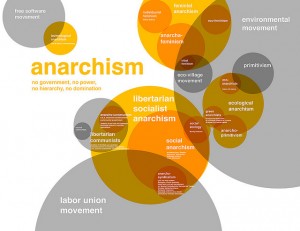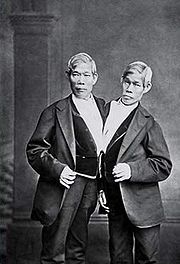Extreme Virtue 6: And Then Again, I Could Be Wrong
by Randall Auxier
I used to play in a musical duo with a wonderful singer/songwriter named Robert Hoyt (here’s a link to some stuff). He was an Earth First! activist who later lived in his truck with a cat going from town to town and rallying the radical dissenters with his political songs. He came to be very well-known among such activists of that generation, many of whom called themselves “anarchists.” Robert belonged on the right hand side of this illustration, sort of a libertarian socialist ecological type.
An independent filmmaker once did a documentary on Robert called “Travels with Claude” (this was the name of Robert’s cat, and the title plays on John Steinbeck‘s Travels with Charley –Steinbeck’s dog). The filmmaker (Paul Bonesteel) traveled with Robert and filmed for about two weeks in Wisconsin, Illinois, and Michigan, from show to show, fishing their dinner from dumpsters and discussing the ecological disaster that is underway. As they arrived in Detroit for a show at the “Lothlorien Co-op,” Robert turned to Paul (and his camera) and said, basically, “tonight’s show is at an anarchists’ co-op –great people, but, as the name suggests, not very organized.”
And there you have it. Anarchy. The absence of organization. Everybody doing just whatever they think is right (or good, or pleasurable, or allowable . . .). So, it isn’t surprising that there are lots and lots of kinds of anarchists. Check this image above. Some kinds of anarchists don’t seem to have any common ground with others. Some are more oriented on community, consensus, justice, or peace. Others are extreme individualists, focussed on freedom –free will, voluntary economic association, even uncontrolled markets. Others are communistic or socialistic. Some favor violent revolution. Emma Goldman was more the revolutionary socialist soldier of the dispossessed. She was an individual for sure, but no individualist. She was deeply committed, but, by most accounts, not very “self-reflective.”
What does that mean? Crispin Sartwell observes in his book Extreme Virtue that several important virtues have almost entirely disappeared from the public personae of our leaders (political, social, religious, cultural). He finds this trend disturbing. I mentioned in the first blog in this series that the trust of my own generation was really destroyed by the Watergate Scandal, but more than just that has happened in recent decades. Another victim of modern mass culture is what Sartwell calls “self-reflection.” He chooses that name because the virtue he is talking about doesn’t have a really clear name in English. So let me describe this virtue.
People who are self-reflective are able to question themselves in appropriate ways, to express uncertainty where it is present, and to change their minds when they can see that an earlier view was in error. Self-reflective people can apologize from the heart when they have wronged someone and they are always alert to the possibility of having done so. Self-reflective people are able to empathize with the struggles of others and tend to value those struggles above their own private problems. This is the temperament, but what is the virtue?
Those with a well developed power of self-reflection tend to be humble and they err on the side of favoring others above themselves. They see themselves as examples of the human condition, imperfect but striving. Interestingly, self-reflective people may also have a sense of humor about their own occasional folly. I think this last feature is rarer than the others because self-reflective people tend to be serious and dominated by pathos (which is the killer of all humor), but when highly developed, this kind of character can also blossom into a kind of self-deprecating (not self-effacing) wit.
We all know people who have some or all of these qualities. It is impossible not to respect people who have this virtue. But we don’t choose them for public office –really we never have, although we once extolled these character traits in ways we don’t today. Yet, for some reason, when it comes to having our lives governed, we choose people who seem more confident than we are ourselves. Self-reflective people have difficulty saying “vote for me” or promoting themselves as able to solve entrenched problems (and, realistically, most of them can’t really be solved). When self-reflection dominates an individual’s character, certain problems may follow: indecisiveness, inability to make commitments, depression, paralysis in the presence a demand for action. The excess of self-reflection is probably worse for all concerned than a deficiency of it.
Sartwell chose as his exemplar of virtuous self-reflection the anarchist writer, lecturer and activist Voltairine de Cleyre. I had never heard her name before reading Sartwell’s book. But anarchists all seem to know who she was. She is not the icon Emma Goldman has become, being a lot less flashy and splashy, but her writings are quite worth the effort to find and ponder. Her views and her life were so different from those of Goldman that it is hard to grasp how both could call themselves anarchists. But then, there are lots of kinds of anarchists, right? How could it be otherwise? De Cleyre was a rabid individualist, defending private property and rejecting even the idea that consensus could be anything more than thinly veiled coercion. She thought that any relationship which bred interdependency among humans ruins our full, human, individuality. Marriage, for instance, was terrible in her opinion, not just because the state and the church use it to control people. Marriage is unnatural because it makes a person a slave for life to his/her present feelings, and because it makes people dependent on each other so that they never become fully individual.
Wow. That all seems extreme. I don’t know if I’d vote for her. I’m pretty sure I wouldn’t vote for myself either. I might vote for Emma though, under the right circumstances. I really have to examine myself on that vexing question about why I vote for people who seem so confident, so sure of themselves, so unself-conscious –people not necessarily even deeply capable of self-doubt. Maybe I just believe that doing something is better than doing nothing? I don’t know. But then, that’s why I’m not your friendly (self-confident, perfect-hair) Senator, or that’s part of it. But then again, I could be wrong.
I wonder how we might make just a little more room for self-reflection in our estimate of who should lead us.
One thing that seriously leads me to doubt Voltairine de Cleyre’s tendencies toward extreme individualism are lessons learned from studying conjoined twins. The fact that it is possible to lead full and rich lives in this condition leads me to believe that there may be more to our connectedness and deep interdependency than we would like to admit. I’ll take that up next.
Meet Chang and Eng Bunker, the original “Siamese” twins, from which the (now politically incorrect) name derives. They had an interesting life, including being married. They were also southern Baptists, of the North Carolina type –and there is no more serious type of Baptist, in my experience. They had ten and eleven children respectively. They owned slaves and ran a plantation. I wonder what the preacher said to them in counseling them about successful marriage. And what would Emma Goldman and Voltairine de Cleyre say? Was it worse that they got married or that they owned slaves, or would it be the same? It strains the limits of propriety to wonder about it, but I am going to do so in my next post.



